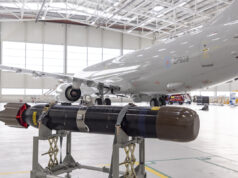The sight of a Russian spy ship around UK waters in recent weeks, for the second time this year, should focus every mind ahead of the November Budget. It is a reminder that our threat environment is not awaiting the future funding model the Government has chosen for our nation’s defence.
The current timeline illustrated by General Sir Richard Barrons this week, writing for Chatham House, will not dissuade those who threaten our national security. No real new defence money until 2027.
This article is the opinion of the author and not necessarily that of the UK Defence Journal. If you would like to submit your own article on this topic or any other, please see our submission guidelines.
A small rise to 2.5 per cent of GDP in that year. A slow build to 3.5 per cent by 2035, with another 1.5 per cent for infrastructure.
All of that sounds ambitious on paper. The difficulty is that the early years involve cuts. General Barrons warns that perhaps two billion pounds must be saved this year through reductions in training, routine activity, and maintenance. It is clear that inflation, exchange rates, and the re-costed Defence Investment Plan have eaten into already stretched budgets. At the very moment our adversaries are most active, the armed forces are being asked to find short term savings.
We saw this week why that is a problem. A hostile state does not wait for a long term funding settlement. It will seek to exploit gaps. In a world where activity at sea, in the air, and in space is constant, awareness is the foundation of deterrence. If we cannot see properly, we cannot respond properly.
This is an area I have written about before. The UK cannot afford strategic blind spots in space. Satellites are no longer a niche capability. They are vital to command, navigation, intelligence, and tracking. They are also essential to modern maritime awareness. The issue is not detection, but that we must maintain a resilient, sovereign picture built from space, from the sea and from the air. I have argued before that if our space capabilities fall behind, or become too dependent on others, the quality and speed of our decision making suffers. We can see what moves around us, but we rely on a chain of space based systems, signals and data that must be strong and coherent. With the former UK Space Agency now absorbed into a wider department, we cannot allow focus on national space capability to drift.
The Strategic Defence Review set intentions, but intentions cannot fill gaps in our defence on their own. It has taken six months just to put in place the senior leadership that will drive delivery. Meanwhile, the risks identified in that same Review continue to grow. As General Barrons wrote, money will arrive long after the risks identified will allow.
The November Budget is a chance to correct this mismatch. Even if the larger increases will only come later, there must be a small but focused injection into defence now. It should be directed at the areas that matter most in the short term – the systems that hold our picture together. Space based surveillance, secure positioning and timing signals, and the data platforms that integrate them. The Government’s recent investment in our national Positioning, Navigation and Timing (PNT) infrastructure is a welcome step, but it needs to be matched by a coherent defence focus that keeps our capabilities resilient and sovereign.
The UK does not need rhetoric about future strength. It needs the ability to act today to keep this country safe. The appearance of a Russian spy ship in our waters is a reminder that the world is not slowing down to match our defence budget timeline. The Government must make sure that Britain is never left looking the wrong way at the wrong time.














Of course it will be ignored. Words may be said at some point but nothing will be done.
I would love to know what % of GDP we will have to spend to stop unarmed Russian survey vessels operating legally in international waters.
I don’t like what the Russians are doing but they are perfectly entitled to do it.
We wrote the law of the sea primarily so we could access other countries littorals.
Unless we are going to change those laws we can spend £1 trillion a year on defence and that ship will still be there.
We are also the country that invented sea bed cable tapping and the USA spent decades crowing about how it did this to the Soviet Union and given the operational status of the USS Jimmy Carter they clearly still are at it.
Do you really think firing lasers at a P8 is legally operating and an indication of being unarmed, or are you just playing Devil’s Advocate?
I didn’t say we should try to stop the ship. That wasn’t the point. The question asked was whether we were going to spend more money on defence and the answer in real terms is NO.
I would love to see some extra money found for Defence in Wednesday’s budget, but I will be amazed if it does. I expect a lot of “jam tomorrow” announcements.
Don’t expect any Jam ever announcements, the treasury is now just a department of the Bank of England.
The Bank of England is independent Jim. So is the OBR and the NSO. Starmer and Reeves make the decisions so all the “jam” we get on Wednesday is down to them.
Any jam announcements will be bigged up but very vague as to when (if ever) they get ordered.
I can guarantee it will be ignored…
Space-based systems are important but they are hardly the only area where critical capability gaps have been allowed to open up. The threats were no less apparent at the last Budget and the Treasury showed no inclination to do anything about funding shortfalls then, so I’m not optimistic this time around. Between avoiding unpopular headlines and funding their various vanity projects the government is hard-pressed to free up any resource for national security.
Makes you feel proud !
Course the Tory MP is going to ask everyone to ignore his own party’s record over the last 14 years and how that has impacted military strength today.
Don’t make it party politics, as they are all to blame. SDR98 was a good document from the then new Labour government. Sadly Gordon would not fund it. Since then Labour, Coalition, Conservative & now Labour again, have all made defence cuts.
Exactly. They’re all responsible.
Sure, but the Tories were in charge of the economy for 14 years before Labour got back in, so the budget headroom and borrowing issues are more at their doorstep than Labour at this point in time.
I don’t think so Labour got in power and gave massive pay rises and spent billions more that is on them and them alone
What Labour has spent in a year is minor compared to the 14 years of effects of the Tories including the market spook by Truss that still causes issues now. Debt to GDP ratios were already well into the 90% by the time Labour got in.
I don’t agree with Trump on most things but his 5% view on defence spending is one I fully endorse.
Pieces like this need to be present in national newspapers, how many will read this if not military/Defence enthusiasts on sites like this?
And until the public demand greater emphasis, I doubt anything will change, as this government, like the last, have no real interest despite the grandstanding.
And as for “real new money” in 2027, how much will the military see when everyone else eating at the defence table has had their fill?
Zilch is my prediction.
To be fair it was on BBC home page as well as Telegraph.
Is that so! Well, that is something.
The answer on “real new money” is none. Not in 2027 or ever in my opinion.
Correct if anything a cut the defence budget is paying for the u.s base on diago Garcia on land we owned until it was given away
Completely barmy but it won’t change. Too many people with their head in the sand.
There is still a large chunk of the British public who don’t want to spend more money on the military. They dont want wars and think the money should be spent elsewhere.
I agree in not wanting war, but in order for peace, you have to be ready to fight a war you dont want to fight. Our entire military should be a detterent not just our nukes. I’d like to see the press talk more about the military again, even if its more inside documentaries following various regiments, or going with Destroyers again etc. Alot of the public need to be shown why we have to spend so much on the military. ruzzia is one threat but its not the only threat.
Indeed. Apparently all the Putins of this world are only like that because of our provocation. if you scrap your ability to defend yourself and generally act like a hippie, all the threats magically go away.
Just like how Putler said he wouldn’t invade Ukraine, everything turned out well then!
This shower is not even listening to MI5/6 etc about the Chinese threat already here,let alone a boat they can’t see from London🤬
The sad news is that even the rise in 2027 isn’t going to make that much difference. It will still see less going to UK Defence capability than we had in 2010, two decades into “the Peace Dividend”. When the Conservative Grant Shapps declared we were no longer in the era of the pece dividend, he was right. Defence has been desperate to get back to peace dividend expenditure for the last 15 years. Even Jeremy Hunt was talking about 3% for defence before he became Chancellor.
The last time the world risks were this high was in the 1980s, towards the end of the Cold War and before glasnost, when we genuinely were putting around 5%-5.5% of GDP into UK Defence. One could even say that it’s more dangerous right now, with many Soviet Era treaties that reduced the chance of nuclear Armageddon having been torn up, not mention a serious war in Europe.
I hope the author reads the comments, because most of us here blame all the parties. I also blame the economists for pretending they know what they are doing. If the back benchers got together, irrespective of party and the front bench views, and agreed to support a cash-injection budget, perhaps something could be done to get us out of this absurd austerity mindset.
There genuinely isn’t any wiggle room.
Something g would have to be cut.
Foreign aid was cut to hand to defence and that was then handed oof to others by rolling them into defence.
Is this the promised 0.2% for 2027? What did it go to?
Non story. Shastri-Hurst is playing party politics. Funding for the frigate building programs has been protected and they are delivering. We have hit the nadir of escort numbers. Next year will see Daring return to duty, Glasgow and Venturer start trials and probably one of Spey or Tamar return to UK waters via a short stay in the Gulf. I would bet the budget will release funds for the 3 mcm ‘motherships’ that the RN want.
We should’ve been rearming these last 5 years+, not continuing cutting. Many allies are getting a wiggle on while we just continue to talk empty words & plan towards becoming the deterrent we needed 5+years ago in the next 10+ years.
HMGs for over a decade asleep at the wheel. Our weakness encourages our enemies aggression.
Reeves can find money for the NHS , she can find money for handouts to the lazy and feckless , she can find money for EU projects , she can find money for pay rises for public sector workers and train drivers , she can find money for net zero nonsense , but she can’t seem to afford to defend this country properly . Why ?
Why indeed? That is the age old question for ANY government but don’t expect any answers!
Quite so . Considering defence of the realm is the first priority of government .
If Europe united more and not squabble and fight less, Then we would have far less debate and arguments over war spending. Europe has a habit of dragging the whole globe into world wars. And countries want to fight over borders, it is common and never ending. Thru out the world there are always countries warring over territories, borders, and seas— on going for decades. Some for centuries, such as Gaza. Ukraine, Russia is not worth WW3. Ukraine is not Germany, or Belgium or Poland. Ukraine has no strategic value for anyone except Russia.